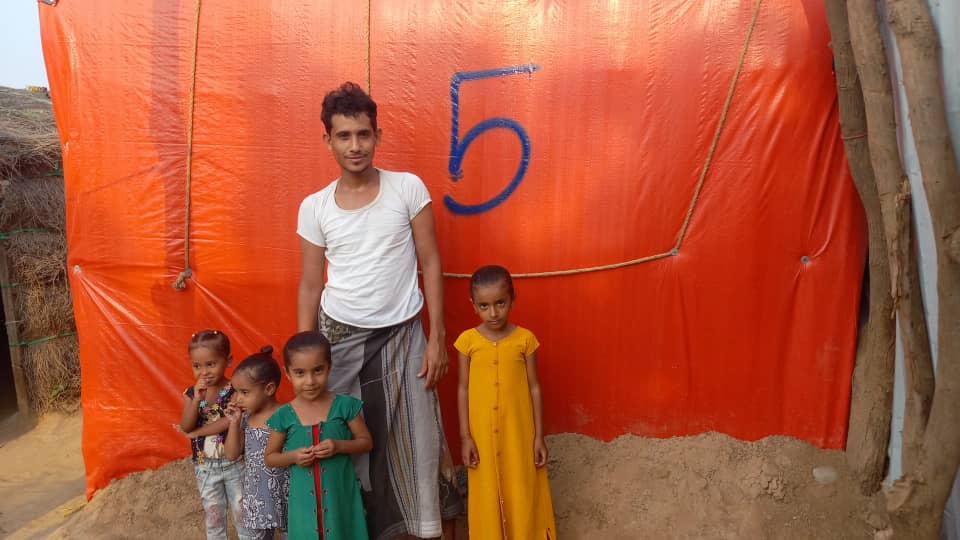.
Success Story: From suffering to safety "Abdulrazzaq''''''''''''''''s Journey with His Family"
NAHRThursday, 01 January, 1970

Abdulrazzaq Muhammad Hadi Abkar, a twenty-six-year-old man, was displaced with his family to the village of Deir Abdo Rabbo in Al-Zaydiyah District, Al-Hudaydah Governorate. He endured a difficult experience after floods and torrents swept away their home, forcing him to search for a safe shelter for his family.
The absence of shelter was not merely the loss of walls and a roof; it was the loss of security and psychological stability. Abdulrazzaq and his family endured daily suffering that weighed heavily on their hearts and intensified their sense of vulnerability in the face of life.
Abdulrazzaq says:
"We had nowhere to go. We slept outdoors, at the mercy of the weather, and fear haunted me every night for my children."
This situation created immense psychological pressure and added to their humanitarian suffering. Funded by the Yemen Humanitarian Fund (YHF) in Yemen, the National Foundation for Development and Humanitarian Response (NAHR) implemented an emergency multi-sectoral life-saving response project covering food, livelihoods, water, sanitation and hygiene (WASH), shelter, and protection to address the deteriorating living conditions in Al-Zaydiyah and Al-Qanawis districts of Al-Hudaydah Governorate.
As part of this project, Abdulrazzaq and his family received an emergency shelter tent, in addition to an emergency toilet, which helped the family regain their privacy and dignity. This intervention provided them with shelter that protects them from weather fluctuations and ensures their basic right to a dignified life.
Abdulrazzaq describes this transformation, saying:
"When we set up the tent, I felt like I was reclaiming a part of my life. For the first time in months, I was able to sleep peacefully, with my children beside me in a safe place."
The impact was not limited to the material aspect alone; it also reflected positively on his psychological state and that of his family. Abdulrazzaq adds:
"Now I can think about other steps to improve my life. I am no longer solely preoccupied with searching for shelter."
Abdulrazzaq's story represents a realistic portrayal of the suffering of thousands of displaced people in Yemen, but it also highlights how a simple intervention, such as providing a safe shelter and toilet, can make a tremendous difference in the life of an entire family.
The absence of shelter was not merely the loss of walls and a roof; it was the loss of security and psychological stability. Abdulrazzaq and his family endured daily suffering that weighed heavily on their hearts and intensified their sense of vulnerability in the face of life.
Abdulrazzaq says:
"We had nowhere to go. We slept outdoors, at the mercy of the weather, and fear haunted me every night for my children."
This situation created immense psychological pressure and added to their humanitarian suffering. Funded by the Yemen Humanitarian Fund (YHF) in Yemen, the National Foundation for Development and Humanitarian Response (NAHR) implemented an emergency multi-sectoral life-saving response project covering food, livelihoods, water, sanitation and hygiene (WASH), shelter, and protection to address the deteriorating living conditions in Al-Zaydiyah and Al-Qanawis districts of Al-Hudaydah Governorate.
As part of this project, Abdulrazzaq and his family received an emergency shelter tent, in addition to an emergency toilet, which helped the family regain their privacy and dignity. This intervention provided them with shelter that protects them from weather fluctuations and ensures their basic right to a dignified life.
Abdulrazzaq describes this transformation, saying:
"When we set up the tent, I felt like I was reclaiming a part of my life. For the first time in months, I was able to sleep peacefully, with my children beside me in a safe place."
The impact was not limited to the material aspect alone; it also reflected positively on his psychological state and that of his family. Abdulrazzaq adds:
"Now I can think about other steps to improve my life. I am no longer solely preoccupied with searching for shelter."
Abdulrazzaq's story represents a realistic portrayal of the suffering of thousands of displaced people in Yemen, but it also highlights how a simple intervention, such as providing a safe shelter and toilet, can make a tremendous difference in the life of an entire family.
